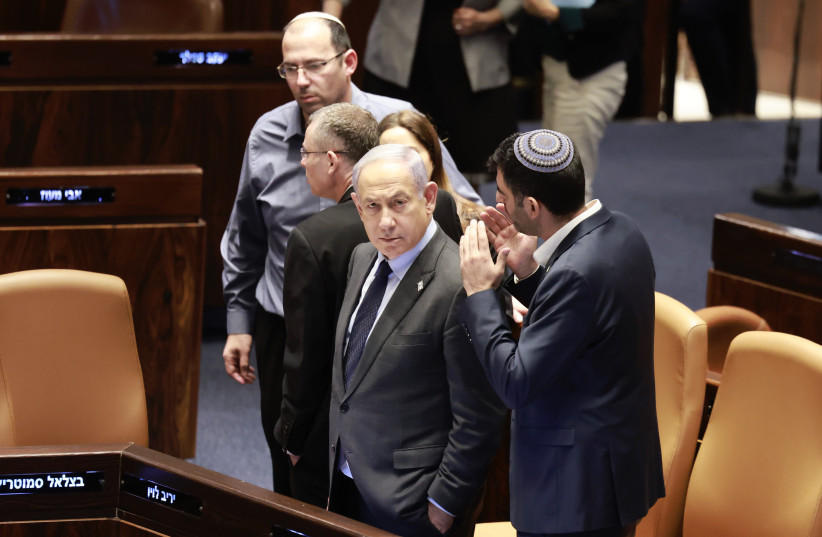The amended budget for the rest of 2023 passed its first reading in a 62-53 vote in Knesset on Wednesday and was immediately transferred to the Finance Committee for preparation for its second and third readings.
The vote had one of the highest attendance rates since the beginning of the war with plenum sessions in the last couple of months being attended by only about 20 MKs at a time, but the Knesset was almost full for the vote on Wednesday.
The bill gained almost unanimous support from the coalition with 62 out of 64 of coalition MKs voting for it. The two who didn't were Defense Minister Yoav Gallant, who wasn't present as he oversees the war effort, and Nir Barkat, who abstained after he expressed public opposition for the budget as it was presented to the Knesset.
The amended budget seeks to add NIS 30.5 billion to the budget for the rest of December, and more than half is intended for military use in the war with the rest benefiting civil objectives.
Budget faces opposition due to coalition funds
Despite the massive increase to the budget for the management of the war, the bill was one of the only ones throughout the war that wasn't widely agreed on across the political spectrum and is heavily criticized by the opposition who were enraged by its continued inclusion of coalition funds, which Prime Minister Benjamin Netanyahu and Finance Minister Bezalel Smotrich promised not to use during the war.

While the original sum of coalition funds that were passed in the state budget at the beginning of the year were cut down for the amended budget, they still include billions of shekels that are being used for the benefit of unregulated ultra-Orthodox education where the students aren't taught core subjects, organizations that help ultra-Orthodox men get out of compulsory military service, and services such as "family purity counseling" and "Jewish identity".
The opposition believes that these uses are not conducive to national unity in the face of the war and are discriminatory against the sectors of Israeli society who did not vote for the coalition parties.
Meanwhile, Smotrich and Netanyahu claim that the coalition funds were significantly cut and that what remains in the bill is essential.
The opposition were not the only ones to oppose the budget, however. Ever since it was presented by Smotrich last week, Barkat expressed his dissatisfaction with it, claiming that it was severely damaging to Israel's economy.
"I will not support the state budget if at least NIS 250 million are not allocated to saving the businesses in the South and the North from collapse," he said on Wednesday morning in the Finance Committee before the Knesset vote.
"Does it sound reasonable to anyone in this room that the reserves who are risking their lives on the frontlines need to worry about their income? If the businesses in the areas near the fighting collapse and don't survive the war, it will be a victory for Hamas. As Israel's economy minister, I will not lend a hand to a budget that will lead to the collapse of businesses on the periphery."
Barkat was not alone from the Likud to criticize the bill. On Tuesday, MKs Eli Dalal and Eliyahu Revivo threatened to vote against it in the pre-plenum committee meeting but eventually voted for it.
On Wednesday, Likud MK Yuli Edelstein spoke in the Knesset plenum before the vote saying that while he agreed with the uses to which the coalition funds would be put to use, he believed that it was a mistake to include them in the budget given the circumstances. He added that he believed the mistake could be rectified while the bill was being prepared for the second and third readings and ultimately voted for it.
